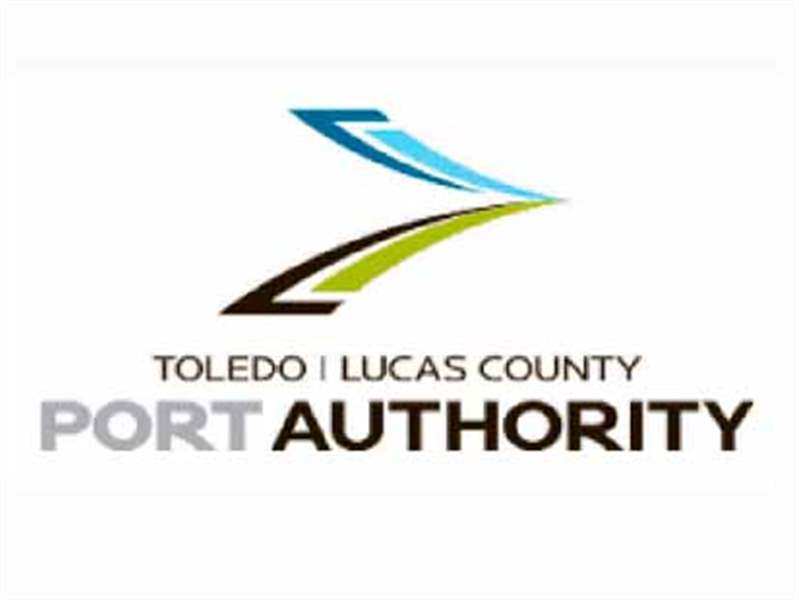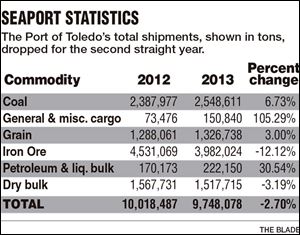
Cargo dips, yet port has best year since 2007
2/3/2014

Cargo shipments through Toledo’s Great Lakes port dipped 2.7 percent on a weight basis during the 2013 shipping season, but port officials are celebrating a doubling of the high-value general-and-miscellaneous traffic sector during the year.
Overall cargo dropped to 9,748,078 tons — the second straight year of decline, and only the second time in Toledo-Lucas County Port Authority history that it dipped below 10 million tons.
But the drop was almost entirely attributable to a 549,000-ton reduction in iron-ore shipments, which fluctuate with the fortunes and raw-materials purchasing practices of one company, AK Steel, whose steel mills in Middletown, Ohio, and Ashland, Ky., are the primary — if not exclusive — receiver of Toledo-shipped ore.
Toledo’s port terminals also recorded a 50,000-ton decline in dry-bulk cargoes despite the arrival, and later outbound shipment, of an unspecified amount of petroleum coke that had been the target of controversy in Detroit.
All other cargo sectors were up for the year, including coal, which rebounded 6.73 percent after several years of decline; grain, petroleum, and liquid bulk, and the general-cargo category, which includes such cargoes as steel, aluminum, and heavy equipment.
Those cargoes are especially important because of the labor involved in their loading and unloading, compared to the heavy mechanization of the port’s bulk-products terminals.
“This is the stuff that produces the most economic impact for us,” said Joe Cappel, the port authority’s director of cargo development. “A ton of steel is not the same as a ton of cargo. This was our best year since 2007 — we had a lot of aluminum, and we also started to receive some inbound coiled steel again.
“We also had some project cargoes [heavy machinery] for several refineries,” he added.
Other significant commodities handled at the general-cargo dock included coal, limestone, titanium ore, pig iron, bulk sugar, and petroleum coke.

The oil-refining by-product also known as petcoke long has been handled at the port authority’s general- cargo docks for export as a fuel.
Historically, it has come from local refining, but last year, petcoke from Detroit was transferred to Toledo, then later shipped out on several vessels, after complaints arose about oily petcoke dust blowing from the Detroit waterfront into nearby neighborhoods.
Terry Leach, operations director for Midwest Terminals of Toledo International, said dust-control measures were in place throughout the Toledo port, just as is done with local petcoke, and air monitoring is required by Midwest’s Ohio Environmental Protection Agency permit.
“We have to have misters on our conveyor systems when we’re loading vessels, and we use a sealant on the piles,” Mr. Leach said. “... We want to be a good neighbor. We don’t want to contaminate anything.”
The bulk sugar delivered by Toledo’s first overseas ship of the 2013 shipping season marked the first sugar cargo to arrive here since 2008.
Mr. Cappel said port officials continue their efforts to diversify the cargoes shipped through Toledo so the port isn’t dependent on the fortunes of a small number of industries or shippers.
“Some of the more traditional staple cargoes, like coal and iron ore, may be pretty flat” during the 2014 shipping season, he said — especially if AK Steel shifts raw-steel production to a plant it is building in western Indiana.
The port authority’s new Ironville Dock facility, on part of the former Gulf Oil refinery site along Front Street, provides “more terminal capacity for bulk products” and may be especially suited for transloading oil or other liquids, Mr. Cappel said.
The new dock also provides competitive railroad access for port shippers, who previously only had access to CSX Transportation service.
“Ironville gives us direct access to Norfolk Southern, and we’re going to try to target some customers that may benefit from that,” Mr. Cappel said. “We’re also going to continue our capital improvements on our docks and at the [Toledo] Shipyard.”
Contact David Patch at: dpatch@theblade.com or 419-724-6094.